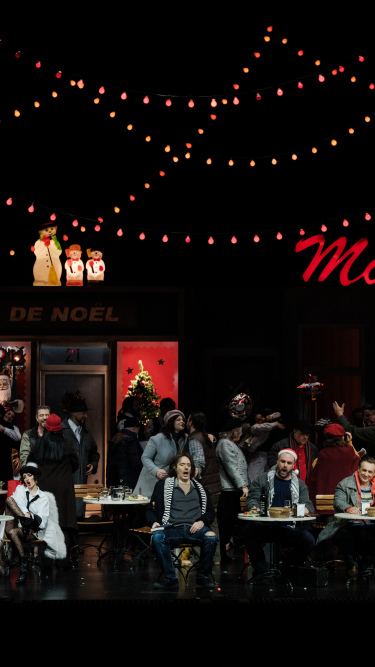

temp
LA BOHEME
Τζάκομο Πουτσίνι
150'
From
Description
The hugely popular La Bohème by Graham Vick — 'the man who saved opera in Britain' (Telegraph) — is coming to GNO TV.
La bohème is based on the novella Scènes de la vie de bohème (“Scenes of Bohemian Life”) by Henry Murger, and was first presented in 1896 at the Teatro Regio in Turin, conducted by Arturo Toscanini. Set against the backdrop of an icy Paris at Christmastime, the plot of this opera tells of the love between the poet Rodolfo and the seamstress Mimì, from the moment they meet to the moment of her death from consumption. With his powerfully evocative music, Puccini makes audiences run the gamut of emotions in ways sublime: joy and abandon, great love and despair.
The funding body of the project is the Ministry of Culture, within the framework of the National Recovery and Resilience Plan "Greece 2.0" with funding from the European Union - NextGeneration EU.
Recorded in Stavros Niarchos Hall of the Greek National Opera – SNFCC on 21 and 27 December 2024.
At a glance – Synopsis
La bohème at a glance
The composer / Giacomo Puccini was born in Lucca, Tuscany, on 22 December 1858. Not only was he the fifth of seven children, he was also a fifth-generation musician to spring from a dynasty of local cathedral organists, conductors, and composers (in the main of church music). Puccini remains, to this day, one of the most successful Italian opera composers, since the majority of his works are still performed in repertory at opera houses across the globe. His signature sound had been recognisably forged by just his third opera, Manon Lescaut (1893), while his next three works –La bohème (1896), Tosca (1900), and Madama Butterfly (1904)– saw him celebrated as the most important successor to Giuseppe Verdi. The strikingly melodic music and intense theatricality of his operas gave brilliant answer to the demands of his times. Puccini died in 1924, leaving his final opera –Turandot (1926)– unfinished.
The work / La bohème, “lyrical scenes” in four acts, is based on the novella Scènes de la vie de bohème (“Scenes of Bohemian Life” – 1845/48, 1851) by Henry Murger and on the Théodore Barrière stage play La Vie de bohème (“The Bohemian Life” – 1849), which was inspired by the same source novella. The libretto is by Giuseppe Giacosa and Luigi Illica. The plot tells of the love between the poet Rodolfo and the seamstress Mimì, from the moment they meet to the moment of her ill-fated death from consumption.
Premieres / La bohème was first presented before Italian audiences on 1 February 1896 at the Teatro Regio in Turin, conducted by Arturo Toscanini. Records show that the opera was performed in Athens (in Italian) as early as May 1898. Ever keeping a close eye on developments in the international music scene, the composer Dionysios Lavrangas chose this work as the inaugural production of the Third Hellenic Melodrama opera company, opening on 26 April 1900 at the Municipal Theatre of Athens. La bohème was first presented by the Greek National Opera on 17 April 1948, under the baton of Antiochos Evangelatos.
Creative team – Cast
Conductor
Jacques Lacombe
Stage director: Graham Vick
Revival stage director: Katerina Petsatodi
Sets, costumes: Richard Hudson
Movement director: Ron Howell
Lighting: Giuseppe di Iorio
Chorus master: Agathangelos Georgakatos
Children’s chorus mistress: Konstantina Pitsiakou
Rodolfo
Ivan Magrì
Schaunard
Marios Sarantidis
Benoît
Vangelis Maniatis
Mimì
Anna Sohn (21, 27/12, 5/1)
Vassiliki Karayanni (29, 31/12, 2/1)
Anna Stylianaki (14, 16, 19, 23, 30/3)
Marcello
Nikos Kotenidis
Colline
Tassos Apostolou
Alcindoro
Kostis Rassidakis
Musetta
Danae Kontora
Parpignol
Thanassis Evangelou
Customs sergeant
Ioannis Kontellis
Customs official
Yannis Stamatakis
With the Orchestra, Chorus and Children's Chorus of the Greek National Opera (as part of its educational mission)

